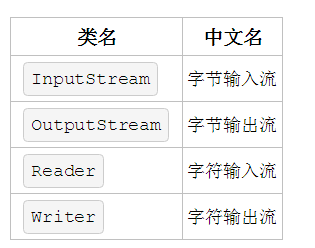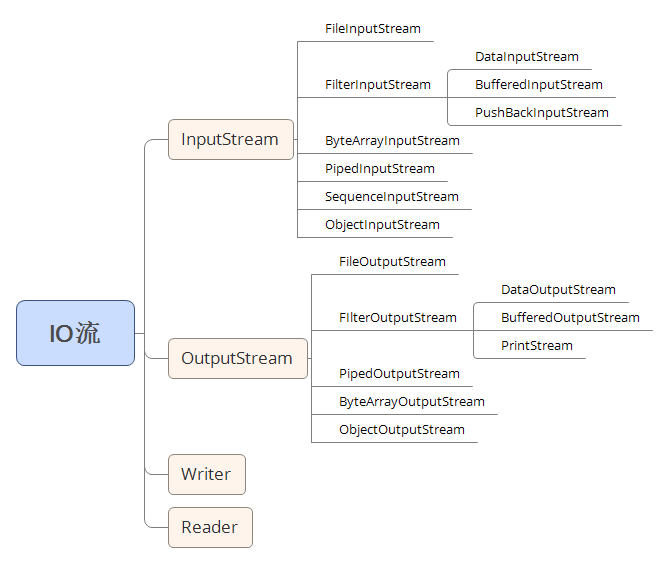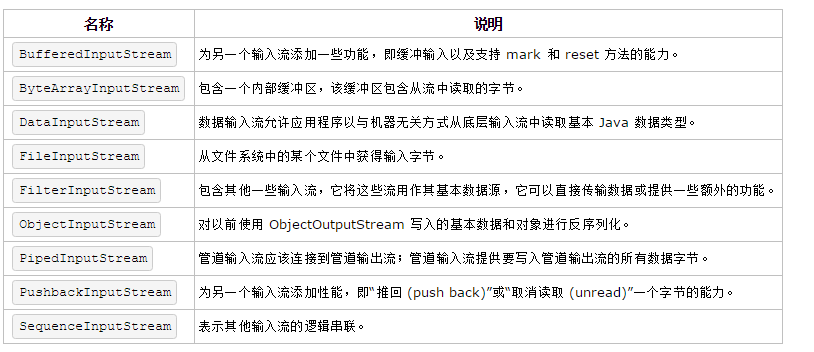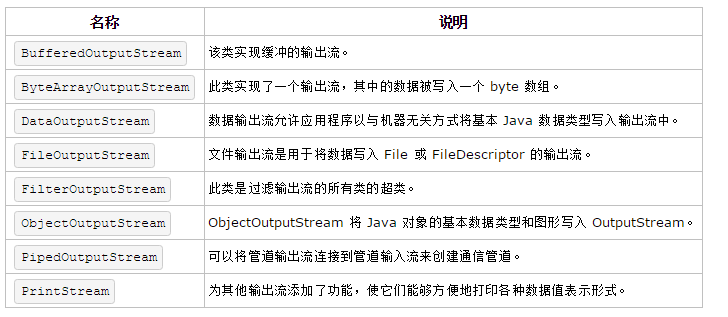Java byte stream
Java中的输入是指从数据源等读到Java程序中,这里的数据源可以是文件,内存或网络连接,输出则是指从Java程序中写到目的地。
输入输出流可以分为以下几种类型(暂时不考虑File类)

Java IO共涉及40多个类,下图是字节流各个类之间的关系

InputStream
InputStream的子类及其说明有如下所示

OutputStream
OutputStream的子类及其说明有如下所示

对于类中方法的熟悉不详述了,可以参照JDK文档,或者可以试着在IDE中,实例化上面的类,使用此类对象时,按下.之后,会出现提示框,再一个一个熟悉就好了。
简单示例
了解了常用的字节流类,下面以文件数据的输入输出说明以上类的使用。
1.在java程序中生成1~20的平方数,并输出到文件中。
package com.songpu;import java.io.BufferedOutputStream;import java.io.FileOutputStream;import java.io.IOException;import java.io.PrintStream;public class MyFileOutputStream {
public static void main (String[] args) throws IOException{ try{
FileOutputStream fos = new FileOutputStream("F:\\test1.txt");
BufferedOutputStream bos = new BufferedOutputStream(fos,1024);
PrintStream ps = new PrintStream(bos,false);
System.setOut(ps); for(int i= 0;i<20;i++){
System.out.println(i*i);
}
ps.close();
}catch(IOException e){
e.printStackTrace();
}
}
}2.将刚才生成的文件中的数据输入到程序,并将其打印到屏幕
package com.songpu;import java.io.*;public class MyFlieInputStream { public static void main(String[] args) throws IOException {
File file = new File("F:\\test1.txt");
FileInputStream in = new FileInputStream(file);
BufferedInputStream bis = new BufferedInputStream(in); byte[] bytes = new byte[(int) file.length()];
do {
bis.read(bytes);
System.out.println(new String(bytes));
}while (bis.read() != -1);
in.close();
}
}再以序列化与反序列化的例子说明ObjectInputStream和ObjectOutputStream的使用
Java序列化是将对象变成二进制形式的一连串字符描述的过程,反序列化就是序列化的相反过程,把这些字符重建为对象。
序列化和反序列化的作用,是保存对象到文件或数据库中,使对象能够传输,序列化的要求是实现Serializable接口,代码如下所示
package com.songpu.serial;import java.io.FileInputStream;import java.io.FileOutputStream;import java.io.IOException;import java.io.ObjectInputStream;import java.io.ObjectOutputStream;import java.io.OutputStream;import java.io.Serializable;/*
* 待序列化的类,实现序列化接口
*/class Person implements Serializable{ public String name; public int age; public Person(String name, int age) { super(); this.name = name; this.age = age;
} public String getName() { return name;
} public void setName(String name) { this.name = name;
} public int getAge() { return age;
} public void setAge(int age) { this.age = age;
}
}/*
* 测试类
*/public class SerialTest{ public static void main(String[] args) throws IOException, ClassNotFoundException{
ObjectOutputStream oos = new ObjectOutputStream(new FileOutputStream("F:\\test.txt"));
Person p0 = new Person("tangsong",21);
oos.writeObject(p0);
oos.flush();
oos.close();
deserial();
}
public static void deserial() throws ClassNotFoundException, IOException{
ObjectInputStream ois = new ObjectInputStream(new FileInputStream("F:\\test.txt"));
Person p1 = (Person)ois.readObject();
ois.close();
System.out.println("Name="+p1.getName()+";Age="+p1.getAge());
}
}运行上述代码的结果如下:


Hot AI Tools

Undresser.AI Undress
AI-powered app for creating realistic nude photos

AI Clothes Remover
Online AI tool for removing clothes from photos.

Undress AI Tool
Undress images for free

Clothoff.io
AI clothes remover

Video Face Swap
Swap faces in any video effortlessly with our completely free AI face swap tool!

Hot Article

Hot Tools

Notepad++7.3.1
Easy-to-use and free code editor

SublimeText3 Chinese version
Chinese version, very easy to use

Zend Studio 13.0.1
Powerful PHP integrated development environment

Dreamweaver CS6
Visual web development tools

SublimeText3 Mac version
God-level code editing software (SublimeText3)

Hot Topics
 1660
1660
 14
14
 1416
1416
 52
52
 1310
1310
 25
25
 1260
1260
 29
29
 1233
1233
 24
24
 Break or return from Java 8 stream forEach?
Feb 07, 2025 pm 12:09 PM
Break or return from Java 8 stream forEach?
Feb 07, 2025 pm 12:09 PM
Java 8 introduces the Stream API, providing a powerful and expressive way to process data collections. However, a common question when using Stream is: How to break or return from a forEach operation? Traditional loops allow for early interruption or return, but Stream's forEach method does not directly support this method. This article will explain the reasons and explore alternative methods for implementing premature termination in Stream processing systems. Further reading: Java Stream API improvements Understand Stream forEach The forEach method is a terminal operation that performs one operation on each element in the Stream. Its design intention is
 PHP: A Key Language for Web Development
Apr 13, 2025 am 12:08 AM
PHP: A Key Language for Web Development
Apr 13, 2025 am 12:08 AM
PHP is a scripting language widely used on the server side, especially suitable for web development. 1.PHP can embed HTML, process HTTP requests and responses, and supports a variety of databases. 2.PHP is used to generate dynamic web content, process form data, access databases, etc., with strong community support and open source resources. 3. PHP is an interpreted language, and the execution process includes lexical analysis, grammatical analysis, compilation and execution. 4.PHP can be combined with MySQL for advanced applications such as user registration systems. 5. When debugging PHP, you can use functions such as error_reporting() and var_dump(). 6. Optimize PHP code to use caching mechanisms, optimize database queries and use built-in functions. 7
 PHP vs. Python: Understanding the Differences
Apr 11, 2025 am 12:15 AM
PHP vs. Python: Understanding the Differences
Apr 11, 2025 am 12:15 AM
PHP and Python each have their own advantages, and the choice should be based on project requirements. 1.PHP is suitable for web development, with simple syntax and high execution efficiency. 2. Python is suitable for data science and machine learning, with concise syntax and rich libraries.
 PHP vs. Other Languages: A Comparison
Apr 13, 2025 am 12:19 AM
PHP vs. Other Languages: A Comparison
Apr 13, 2025 am 12:19 AM
PHP is suitable for web development, especially in rapid development and processing dynamic content, but is not good at data science and enterprise-level applications. Compared with Python, PHP has more advantages in web development, but is not as good as Python in the field of data science; compared with Java, PHP performs worse in enterprise-level applications, but is more flexible in web development; compared with JavaScript, PHP is more concise in back-end development, but is not as good as JavaScript in front-end development.
 PHP vs. Python: Core Features and Functionality
Apr 13, 2025 am 12:16 AM
PHP vs. Python: Core Features and Functionality
Apr 13, 2025 am 12:16 AM
PHP and Python each have their own advantages and are suitable for different scenarios. 1.PHP is suitable for web development and provides built-in web servers and rich function libraries. 2. Python is suitable for data science and machine learning, with concise syntax and a powerful standard library. When choosing, it should be decided based on project requirements.
 Java Program to Find the Volume of Capsule
Feb 07, 2025 am 11:37 AM
Java Program to Find the Volume of Capsule
Feb 07, 2025 am 11:37 AM
Capsules are three-dimensional geometric figures, composed of a cylinder and a hemisphere at both ends. The volume of the capsule can be calculated by adding the volume of the cylinder and the volume of the hemisphere at both ends. This tutorial will discuss how to calculate the volume of a given capsule in Java using different methods. Capsule volume formula The formula for capsule volume is as follows: Capsule volume = Cylindrical volume Volume Two hemisphere volume in, r: The radius of the hemisphere. h: The height of the cylinder (excluding the hemisphere). Example 1 enter Radius = 5 units Height = 10 units Output Volume = 1570.8 cubic units explain Calculate volume using formula: Volume = π × r2 × h (4
 PHP's Impact: Web Development and Beyond
Apr 18, 2025 am 12:10 AM
PHP's Impact: Web Development and Beyond
Apr 18, 2025 am 12:10 AM
PHPhassignificantlyimpactedwebdevelopmentandextendsbeyondit.1)ItpowersmajorplatformslikeWordPressandexcelsindatabaseinteractions.2)PHP'sadaptabilityallowsittoscaleforlargeapplicationsusingframeworkslikeLaravel.3)Beyondweb,PHPisusedincommand-linescrip
 PHP: The Foundation of Many Websites
Apr 13, 2025 am 12:07 AM
PHP: The Foundation of Many Websites
Apr 13, 2025 am 12:07 AM
The reasons why PHP is the preferred technology stack for many websites include its ease of use, strong community support, and widespread use. 1) Easy to learn and use, suitable for beginners. 2) Have a huge developer community and rich resources. 3) Widely used in WordPress, Drupal and other platforms. 4) Integrate tightly with web servers to simplify development deployment.




